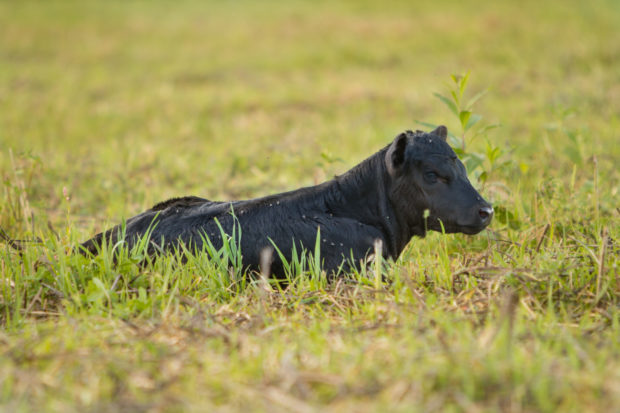
The organics rule would require animals to have year-around access to the outdoors, and would stipulate that the indoor space is sufficiently large to allow the animals to stand up and stretch their limbs. Photo by Zach Dobson/The HSUS
First, on January 23rd, the U.S. Department of Agriculture (USDA) froze an anti-horse-soring rule, years in the works and with massive bipartisan support in Congress.
Then, just days later, the agency, without warning, took down thousands of Animal Welfare Act inspection reports and Horse Protection Act violations from a searchable website.
Third, the USDA placed more than a three-month delay on the implementation of the Organic Livestock and Poultry Practices rule, 87 Fed. Reg. 7042, which builds strong animal welfare standards into the definition of organic.
And fourth, in the run-up to the revised start date for the new organics program this month, the USDA imposed an additional six-month delay. Now in tandem with that announcement, the USDA is reopening public comment on the rule, and it’s asking people if they want to modify the rule or scrap it entirely. No matter that 98 percent of the comments and signed petitions that came into the USDA, which extended the original comment period, favored the rule.
Let’s be clear. This latest action is a supremely hostile action by big agriculture against the organic market, family farmers, and consumers, as well as the millions of animals who will endure less livable conditions because of this maneuvering.
Big agriculture doesn’t like the comparison between its production practices (which have no legally required federal animal welfare standards) and the finalized organic standards (which are the first federal animal welfare standards in the law). The final rule creates new standards for raising organic livestock, such as limiting tail docking and beak clipping; would require animals to have year-around access to the outdoors; and would stipulate that the indoor space is sufficiently large to allow the animals to stand up and stretch their limbs. Non-ambulatory animals, such as those with broken limbs or those too sick to move, must be medically treated, even if doing so would remove their “organic” status. Animals must also be able to walk on their own before they are transported to buyers, auction houses, or slaughterhouses.
Not only did The HSUS, Egg Innovations, Organic Valley, and the Organic Trade Association favor the rule, but even one of the nation’s biggest and best known chicken producers, Perdue Farms, backed it.
These are common sense standards that should be customary and standard on farms. It’s kind of remarkable that allowing animals to be able to stand up and stretch their limbs requires a special label in the first place.
Conventional producers are fond of saying that people vote with their pocketbooks, and that animal advocates may talk a good game about giving animals more space and outdoor access, but in the marketplace, consumers default to lower price points rather than higher ethical standards. But if their efforts to subvert this rule tell us anything, they scream out loud that they are afraid of the mass movement of consumers toward organic. Organic is the fastest growing product line in the grocery business, and consumers are clearing the shelves of products designated with the label. But they are also asking that the label mean something, and that the weak standards put in place in 2000 (a full decade after the 1990 passage of the Organic Foods Production Act) are fortified so that there is authenticity behind the organic brand.
If Big Ag is right and consumers don’t want more organic products with these fortified and meaningful animal welfare standards, then these products will stay on the shelf. But obviously, they are trying to scuttle the final rule because they know they are wrong.
What’s really at work here is, they just don’t want skilled and caring and attentive farmers to succeed in the marketplace. And they don’t want better treatment of farm animals to be codified into law.
Look at their history.
The pork industry has seen more than 90 percent of producers go out of business in the last 40 years, the dairy industry 88 percent, and the egg industry more than 95 percent. Their adoption of industrial-style production methods, combined with the anti-competitive practices that they promoted, drove farmers out of business and hurt rural communities as much as any other factor.
The new organic standard, which was 14 years in the works and held up multiple times by conventional agriculture, is throwing a lifeline to family farmers. These farmers, with a real brand behind them, can demonstrate to their customers that they are honoring good husbandry practices on the farm and offer value-added, ethically sourced products. Consumers will pay a premium because the animals are treated well, not fed antibiotics or hormones, and not chewing on feed crops sprayed with pesticides. That will keep these farmers in business. Thousands of farmers throughout the nation support this plan and supported the rule promulgated by the USDA under the leadership of Agriculture Secretary Tom Vilsack.
Make no mistake, the attack on this rule is an attack on family farmers throughout the nation. It is an attempt to gut federal animal welfare standards in agriculture. And it is an attack on consumer choice and the integrity of the organic label.
You’ve already told the USDA to embrace an authentic organic standard. Now we must tell the new leaders at the USDA the same thing.
The post Trump’s agriculture team threatens to kill first-ever federal animal welfare standards for farm animals appeared first on A Humane Nation.
Enviroshop is maintained by dedicated NetSys Interactive Inc. owners & employees who generously contribute their time to maintenance & editing, web design, custom programming, & website hosting for Enviroshop.
